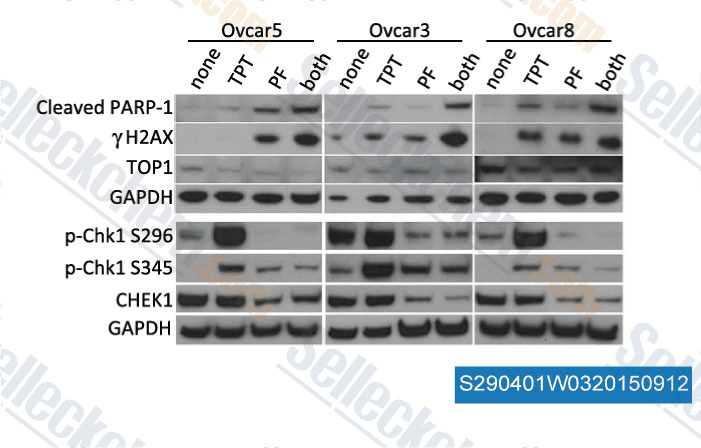|
Toll Free: (877) 796-6397 -- USA and Canada only -- |
Fax: +1-832-582-8590 Orders: +1-832-582-8158 |
Tech Support: +1-832-582-8158 Ext:3 Please provide your Order Number in the email. |
Technical Data
| Formula | C22H25N7O2 |
|||
| Molecular Weight | 419.48 | CAS No. | 952021-60-2 | |
| Solubility (25°C)* | In vitro | DMSO | 83 mg/mL (197.86 mM) | |
| Water | Insoluble | |||
| Ethanol | Insoluble | |||
|
* <1 mg/ml means slightly soluble or insoluble. * Please note that Selleck tests the solubility of all compounds in-house, and the actual solubility may differ slightly from published values. This is normal and is due to slight batch-to-batch variations. * Room temperature shipping (Stability testing shows this product can be shipped without any cooling measures.) |
||||
Preparing Stock Solutions
Biological Activity
| Description | PF-477736 (PF-736, PF-00477736) is a selective, potent and ATP-competitive Chk1 inhibitor with Ki of 0.49 nM in a cell-free assay and also inhibits VEGFR2, Aurora-A, FGFR3, Flt3, Fms (CSF1R), Ret and Yes. It shows ~100-fold selectivity for Chk1 than Chk2. | ||||||||||
|---|---|---|---|---|---|---|---|---|---|---|---|
| Targets |
|
||||||||||
| In vitro | PF-477736 (128 nM) abrogates the camptothecin-induced DNA damage checkpoint in a dose-dependent manner in CA46 and HeLa cells. PF-477736 effectively abrogates the -induced S-phase arrest with a corresponding increase in apoptotic cell populations in HT29 cells. PF-477736 (540 nM) enhances -induced cytotoxicity in a time- and dose-dependent manner in HT29 cells. PF-477736 potentiates the growth-inhibitory activity of a panel of chemotherapeutic agents across a broad spectrum of p53-deficient human cancer cell lines in the MTT assay. Addition of PF-477736 (360 nM) to -arrested cells induces a dramatic increase in the intensity of H2AX phosphorylation, reflecting a greater number of γ-H2AX molecules near sites of DNA damage. [1] PF-477736 (0.5 nM) selectively blocks p73 and P53 phosphorylation in presence of curcumin in HL-60 cells. [2] PF-477736 (360 nM) suppresses -induced phosphorylation of histone H3 (Ser10) and Cdc25C (Ser216) and potentiates apoptosis in COLO205 cells. [3] PF-477736 (250 nM) combined with MK-1775 has marked synergistic cytotoxic activity in OVCAR-5 cells. PF-477736 (250 nM) combined with MK-1775 causes accumulation of cells with a DNA content between 2N and 4N in OVCAR-5 cells. PF-477736 (250 nM) combined with MK-1775 causes premature mitosis before the end of DNA replication, with damaged DNA leading to apoptotic cell death in OVCAR-5 cells. [4] |
||||||||||
| In vivo | PF-477736 (4 mg/kg i.v.) results in terminal half-life (T1/2) of 2.9 hours, AUC of 5.72 μg×hr/mL and CLp of 11.8 mL/min/kg in rats. PF-477736 dose-dependently enhances the antitumor activity of a maximum tolerated dose in the Colo205 xenograft mouse model. PF-477736 (12 mg/kg) induces an increase in the phosphorylation of histone H3 (Ser10) and of phospho-histone H2AX in the Colo205 xenograft mouse model. [1] PF-477736 (15 mg/kg i.p.) enhances induced tumor growth inhibition and tumor growth delay in COLO205 and MDA-MB-231 xenograft models. [3] PF 477736 (10 mg/kg once daily i.p.) combined with MK-1775 (30 mg/kg twice a day oral) leads to greater tumor growth inhibition in mice bearing OVCAR-5 xenografts. [4] |
Protocol (from reference)
| Kinase Assay: |
|
|---|---|
| Cell Assay: |
|
| Animal Study: |
|
References
Customer Product Validation

-
Data from [Data independently produced by , , BMC Cancer, 2015, 10.1186/s12885-015-1231-z]
Selleck's PF-477736 has been cited by 35 publications
| Centrioles are frequently amplified in early B cell development but dispensable for humoral immunity [ Nat Commun, 2024, 15(1):8890] | PubMed: 39406735 |
| An RNA damage response network mediates the lethality of 5-FU in colorectal cancer [ Cell Rep Med, 2024, 5(10):101778] | PubMed: 39378883 |
| ATR, CHK1 and WEE1 inhibitors cause homologous recombination repair deficiency to induce synthetic lethality with PARP inhibitors [ Br J Cancer, 2024, 10.1038/s41416-024-02745-0] | PubMed: 38965423 |
| A multiparametric screen uncovers FDA-approved small molecules that potentiate the nuclear mechano-dysfunctions in ATR-defective cells [ Sci Rep, 2024, 14(1):30786] | PubMed: 39730498 |
| Mild replication stress causes premature centriole disengagement via a sub-critical Plk1 activity under the control of ATR-Chk1 [ Nat Commun, 2023, 14(1):6088] | PubMed: 37773176 |
| Mild replication stress causes premature centriole disengagement via a sub-critical Plk1 activity under the control of ATR-Chk1 [ Nat Commun, 2023, 14(1):6088] | PubMed: 37773176 |
| BRD7 suppresses tumor chemosensitivity to CHK1 inhibitors by inhibiting USP1-mediated deubiquitination of CHK1 [ Cell Death Discov, 2023, 9(1):313] | PubMed: 37626049 |
| The p38/MK2 Pathway Functions as Chk1-Backup Downstream of ATM/ATR in G2-Checkpoint Activation in Cells Exposed to Ionizing Radiation [ Cells, 2023, 12(10)1387] | PubMed: 37408221 |
| Deregulation and epigenetic modification of BCL2-family genes cause resistance to venetoclax in hematologic malignancies [ Blood, 2022, blood.2021014304] | PubMed: 35704690 |
| Resistance to ATR Inhibitors Is Mediated by Loss of the Nonsense-Mediated Decay Factor UPF2 [ Cancer Res, 2022, 82(21):3950-3961] | PubMed: 36273492 |
RETURN POLICY
Selleck Chemical’s Unconditional Return Policy ensures a smooth online shopping experience for our customers. If you are in any way unsatisfied with your purchase, you may return any item(s) within 7 days of receiving it. In the event of product quality issues, either protocol related or product related problems, you may return any item(s) within 365 days from the original purchase date. Please follow the instructions below when returning products.
SHIPPING AND STORAGE
Selleck products are transported at room temperature. If you receive the product at room temperature, please rest assured, the Selleck Quality Inspection Department has conducted experiments to verify that the normal temperature placement of one month will not affect the biological activity of powder products. After collecting, please store the product according to the requirements described in the datasheet. Most Selleck products are stable under the recommended conditions.
NOT FOR HUMAN, VETERINARY DIAGNOSTIC OR THERAPEUTIC USE.
